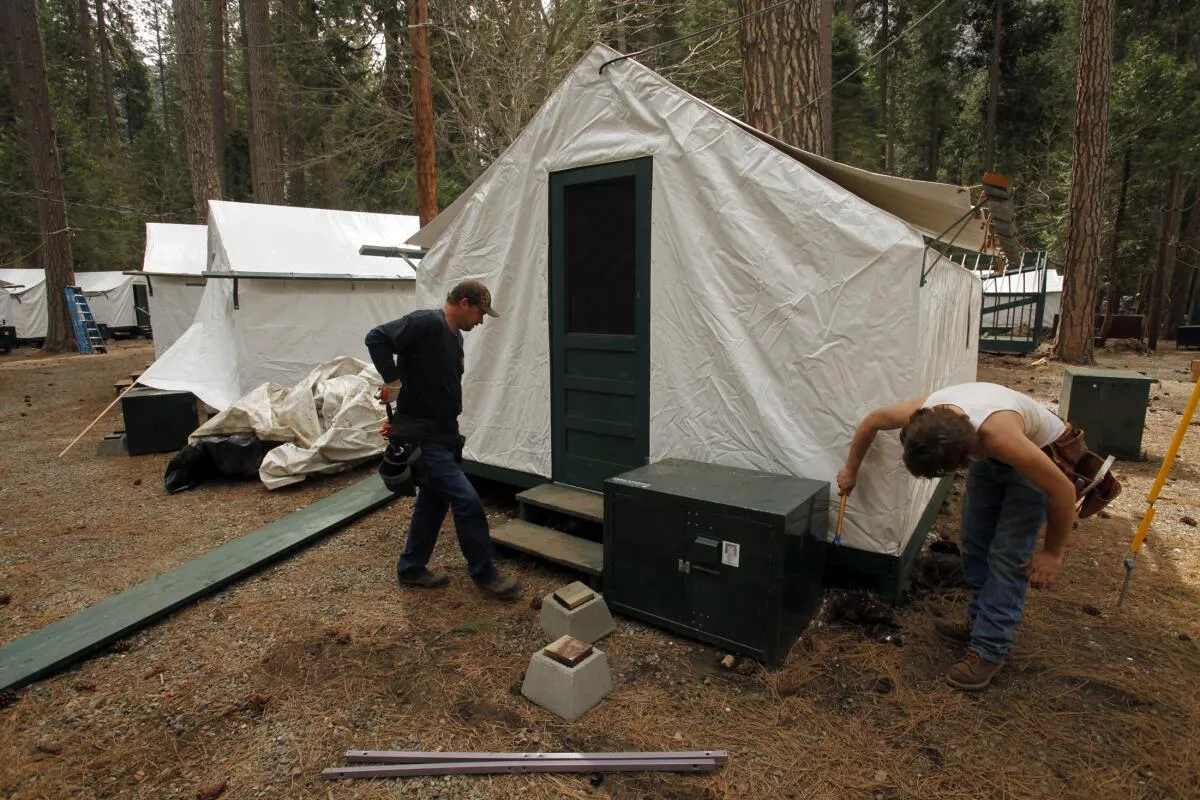Yosemite National Park’s High Sierra Camps Remain Closed for the Summer
A Look at the Reasons Behind the Closure and the Impact on Nature Enthusiasts
Yosemite National Park, a gem in the Sierra Nevada of California, is known for its breathtaking views, unique rock formations, and unparalleled natural beauty. However, this summer, adventurers and nature lovers planning to experience the iconic High Sierra Camps will be disappointed to learn that, once again, the facilities will remain closed for the season.
For many visitors, the High Sierra Camps represent the pinnacle of backcountry camping experiences. These camps provide an opportunity for hikers and outdoor enthusiasts to immerse themselves in Yosemite’s majestic landscape while enjoying relative comforts like meals and sheltered accommodations. Yet, this year, park officials have made the difficult decision to keep these camps closed, and the reasons reveal the complexity of managing national park resources.
The High Sierra Camps: A Brief Overview
To understand the significance of the closure, it is important to consider what the High Sierra Camps offered. Established in the early 1900s, these camps are located deep within the park’s backcountry, offering five base camps: Glen Aulin, May Lake, Merced Lake, Tuolumne Meadows, and Sunrise. Each camp is strategically placed near stunning natural attractions, including pristine lakes, picturesque meadows, and impressive granite peaks.
The camps typically open for the summer months, drawing thousands of visitors seeking to explore the park’s wild beauty without the strenuous need to carry extensive camping equipment. Meals are provided, and tents are equipped, providing a taste of luxury amid rugged surroundings. This year, however, the backcountry adventure many look forward to will not be available.
The Reasons for Closure
The closure stems from various factors, including lingering impacts from previous years, climate considerations, and ongoing operational challenges. Each of these factors plays a role in the park’s decision-making process.
1. Ongoing Impacts from Wildfires
The aftermath of the California wildfires has profoundly affected many national parks across the state, including Yosemite. The closure of the High Sierra Camps can largely be attributed to the continued recovery efforts required in the wake of these destructive fires. Not only do the wildfires impact the natural environment, but they also damage the infrastructure necessary for running the camps.
Park officials have stated that assessments of trails, camp facilities, and safety measures are ongoing. Given that visitors deserve a safe and enjoyable experience, the management team prioritizes environmental recovery and infrastructure integrity over immediate accessibility.
2. Climate Change and Environmental Concerns
Climate change remains a pressing issue for national parks across the United States. Yosemite, renowned for its massive sequoias and remarkable biodiversity, faces increasing threats from climate change that contribute to unpredictable weather patterns, melting snowpacks, and shifting ecosystems. These changes have led to questions about the suitability of certain areas for sustainable camping.
The High Sierra Camps specifically reside in high-elevation zones that are more susceptible to environmental fluctuations. Park officials are being cautious; planning for the long-term sustainability of the camps is a priority. Ensuring that these camps can be viable in the face of an uncertain climate future is essential.
3. Staffing and Operational Challenges
The staffing crisis affecting many industries has also found its way into national parks, including Yosemite. Park officials are challenged with recruiting and retaining seasonal staff needed to manage these high-demand camps. The custodial care and operational logistics require a well-trained workforce skilled in outdoor hospitality and safety standards. It is not just about having people to run the camps but ensuring that they provide an experience that meets the park’s high standards.
This staffing shortage is amplified by the COVID-19 pandemic, which has reshaped hiring processes and created a competitive job market. National parks, which tend to rely heavily on seasonal workers, face additional hurdles in staffing these essential roles.
The Impact on Visitors
The closure of the High Sierra Camps will certainly leave a noticeable void for many Yosemite enthusiasts this summer. These camps are not merely places to stay; they serve as gateways for countless hiking adventures, cultural experiences, and opportunities for wildlife encounters. The sceneries surrounding the camps are ideal for witnessing the magnificence of nature while also providing space for introspection and connection.
Many visitors save for years to experience the charms of backcountry camping at Yosemite’s High Sierra Camps. For them, the news of closure brings feelings of disappointment and frustration. Families, groups, and solo adventurers must now search for alternative accommodations, which may not capture the spirit of the High Sierra. While some may opt for traditional campgrounds, these do not provide the same immersive experience as the backcountry camps.
What Are the Alternatives?
Despite the closure, Yosemite offers numerous alternative experiences for visitors eager to explore the park’s breathtaking landscape. The park features a variety of campgrounds, backcountry trails, and organized tours designed to meet a range of interests and outdoor skill levels.
1. Traditional Campgrounds
Visitors can explore the abundance of traditional campgrounds found throughout Yosemite, including the popular North Pines, Wawona, and Crane Flat Campgrounds. These sites provide rustic, natural amenities and easy access to many of the park’s renowned attractions.
2. Guided Backpacking Trips
For those still interested in experiencing backcountry trails, guided backpacking trips led by experienced outfitters could be an option. Such trips arrange logistics, safety training, and gear requirements, allowing campers of all skill levels to connect with nature.
3. Day Hiking and Backpacking
Yosemite boasts a vast network of trails. Many areas in the park remain accessible for day hikes, including the famous Mist Trail, Glacier Point, and the Tuolumne Meadows trails. Visitors can embark on stunning day hikes while appreciating breathtaking vistas, waterfalls, and meandering valleys.
Looking Ahead
As of now, the closure of the High Sierra Camps serves as a reminder of the importance of protecting and maintaining the natural environment. As visitors adapt to the available options this season, many will continue to hope for the future opening of these beloved camps.
The hope is that in the coming years, Yosemite National Park will restore the High Sierra Camps to their former glory. As recovery efforts continue, the emphasis will remain on creating sustainable outdoor experiences, prioritizing environmental health, and maintaining the safety and comfort of visitors.
Ultimately, the beauty and majesty of Yosemite continue to captivate with or without the High Sierra Camps. While this summer may hold some disappointment, the allure of the park’s incredible landscape remains everlasting, offering countless alternatives for exploration, adventure, and inspiration.
Conclusion
In conclusion, while the closure of the High Sierra Camps in Yosemite National Park this summer is bittersweet for many enthusiasts, it provides an opportunity to reflect on how best to balance visitor experiences with responsible environmental stewardship. As we move forward, staying connected with nature and fostering appreciation for such precious ecosystems remains paramount – ensuring the beauty of Yosemite will endure for generations to come.







